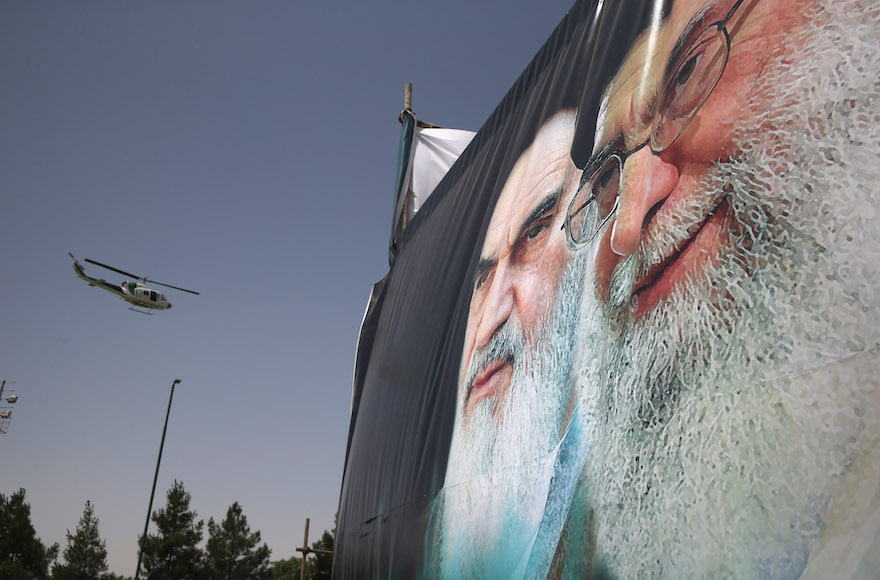Amid rumors, White House rules out giving Iran access to US dollar
Published April 13, 2016

An Iranian police helicopter passes by portraits of Iran’s supreme leader Ayatollah Ali Khamenei, right, and the former Ayatollah Khomeini, in Tehran, Iran, June 4, 2015. (John Moore/Getty Images)
WASHINGTON (JTA) — The Obama administration will continue to block Iran’s access to the dollar or the U.S. financial system, its top sanctions official said amid speculation to the contrary.
ADVERTISEMENT
“We will not provide Iran access to the U.S. financial system, and we will not restore the ‘U-turn’ authorization,” Adam Szubin, the acting undersecretary of the Treasury for terrorism and financial intelligence said Wednesday at a conference of the Foundation for Defense of Democracies.
Until 2008, the U.S. allowed Iran to make U-turn transactions, or offshore-to-offshore payments that crossed the U.S. banking sector for just a second. There has been speculation in the media and among pro-Israel groups that the Obama administration was planning to ease sanctions on Iran beyond what was agreed in the Iran nuclear deal, including possibly allowing U-turn transactions again.
President Barack Obama said earlier this month that such an allowance was not necessary, but Szubin’s statement, made to a think tank that has been highly critical of the Iran nuclear deal, was the first time the administration unequivocally ruled it out.
The sanctions relief for nuclear rollback deal deal keeps in place U.S. sanctions on Iran, but lifts many of the U.S. sanctions on third parties dealing with Iran. Foreign businesses remain wary of dealing with Iran even though the agreement is in place. Obama administration officials have expressed concerns that if Iranians do not feel results, hard-liners in the regime will be able to undercut the deal.
ADVERTISEMENT
Szubin said he would endeavor to make clear to foreign banks that Iran may now access some funds formerly blocked under earlier sanctions.
“We have also seen indications that some non-U.S. banks lack an understanding about the scope of U.S. sanctions with regard to Iranian funds that were formerly restrained,” he said. “We are not blocking Iran’s access to these funds, and we are not encouraging banks or other partners to do so.”
Szubin said that non-nuclear sanctions, triggered by Iran’s backing for terrorism, its missile testing and for its human rights abuses, remain in place.
“Iran continues to support terrorist groups and militant proxies in the region,” he said. “It continues to abuse human rights, and it continues to conduct ballistic missile tests.”
However, he also said the Obama administration opposes any new sanctions targeting Iran’s non-nuclear activities, a warning aimed at Republican senators who have introduced such bills. He said that such sanctions would risk sabotaging the international sanctions regime that brought Iran to the nuclear talks.
“New mandatory non-nuclear sanctions legislation would needlessly risk undermining our unity with international partners,” he said.














